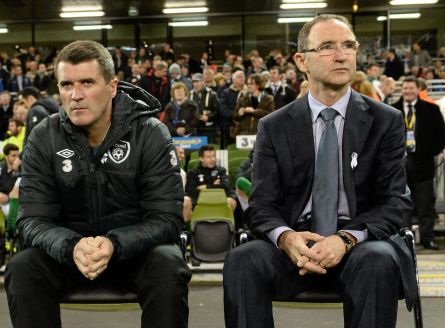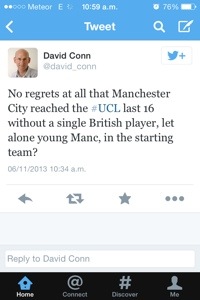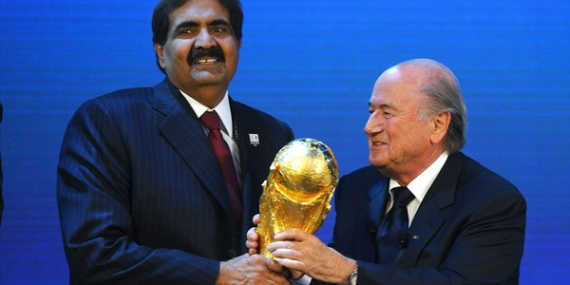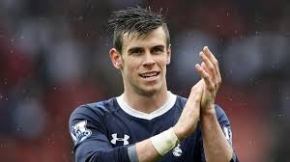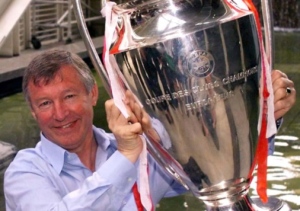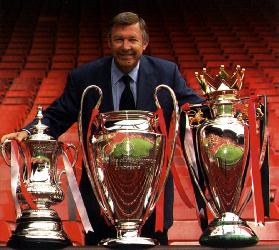A young Sunderland supporter describes what it meant to him to see his beloved ‘Black Cats’ compete in the League Cup final.
27 Nov
Will it be another journey down the rocky road?
On the 5th of November 2013, Martin O’Neill was appointed as manager of the Republic of Ireland national team. This came as little surprise as the Northern Irishman was bookies favourite for the vacant managerial post following Trappattoni’s reign. What did come as somewhat of a surprise was his inclusion of Roy Keane as assistant manager. Despite the history Keane has with the F.A.I after the ‘Saipan incident’; a decade on he claims to bear no grudges with chief executive John Delaney. It is unknown as to whether the F.A.I, along with Denis O’Brien – who will contribute to the wages of O’Neill – believe that O’Neill and Keane are in fact the right men to progress football in this country or if they were just popular choice, guaranteed to increase ticket sales.
Despite the media painting a rather macabre image of Giovanni Trapattoni’s time in charge, he initially achieved what he had set out to do, by reaching Euro 2012. Of course, what followed was embarrassing to say the very least. Following the tournament, the problems began to mount, backlash started to heighten and things began to look very bleak indeed. A poor World Cup qualifying campaign meant that his departure was inevitable. Interim manager Noel King took charge for the remaining two games against Germany and Kazakhstan, a 3-0 loss and 3-1 win. The country is now ranked 60th in the FIFA world rankings, behind Uzbekistan, Cape Verde Islands and Wales.
Unfortunately, the national team is without a competitive fixture until September 2014 so it will be difficult to gauge how the team is doing under the new management team for almost 10 months but the two friendlies that the team has played so far have seen many positives, albeit they were against lacklustre opponents, Latvia and Poland. Speaking on the Lativa game, which Ireland won 3-0, sports writer for the Guardian, Barry Glendenning said, “I was very impressed with the manner in which the players kept the ball down on the floor and pinged it around. I believe their pass completion rate was well over 80%, which is remarkable for an Irish team, particularly when you consider the comparatively sterile dross served up during the Trapattoni regime. Admittedly we were only playing Latvia, who obviously aren’t very good, but some of our play was a complete revelation”.
Obviously, the main objective is to qualify for the European Championship while altering the playing style. There is no doubt that the players will be willing to give it their all, and O’Neill will offer a fresh start for those of whom that have been exiled in the past. e.g Wes Hoolahan, who impressed in the friendlies.
It will be difficult to draw a direct comparison between Trapattoni’s time in charge with the current era of management, as it will be expected that the Irish team qualify for Euro 2016, because 24 teams will participate, rather than 16 in previous tournaments. Glendenning said,“ We should realistically expect to qualify for Euro 2016. That should be the absolute bare minimum requirement and if we don’t, I think his [O’Neill] tenure will have been a failure. I don’t think expecting us to qualify for the knock-out stages would be too big an ask. After that, who knows?”
Currently, the Irish national team needs sustainability and patience, as short-term vision will ultimately lead to failure, once again. The World Cup 2018 is what the team should be really building towards, whilst qualifying for the Euros along the way. O’Neill is realistic with his ambitions and recognises how international management differs greatly with a club, and the challenges that come with it. “My concern of course is a very obvious one: That you don’t work with the players on a day-to-day basis…When you lose a football match at club level you can have a chance to put it right the next week. I’m not so sure what it would be like when they have three months to think about it.” He said in his first press conference at the F.A.I headquarters in Abbottstown.
Labelled as somewhat of a narcissist in the past, Roy Keane’s appointment as assistant manager was unexpected, especially after stints in charge of Sunderland and Ipswich town where he gained experience – good and bad. Putting the incident in 2002 in the past, Keane will install a winning mentality into the players and will expect each the players to act like professionals. “Yes, he’s made mistakes and isn’t always the easiest to work with, but it’s important to remember that the players he’ll be dealing with are grown men. If they can’t handle being pushed to improve themselves, or a bit of constructive criticism from somebody who has been there and bought the t-shirt, then perhaps they shouldn’t be in the squad.” Glendenning said.
One has to wonder what his significance really is. O’Neill has already brought in two of his trusted backroom staff, Steve Walford, who will be coach and replaced goalkeeping coach, Alan Kelly, with Seamus McDonagh. They will more than likely be the ones who take hands on approach in the training sessions considering neither Keane nor O’Neill consider man- management as their main skills. Keane does look forward to dipping into the talent pool on offer, saying; “It won’t be hassle for me, I enjoy watching football matches. It’s in my nature.”
For the first time in years, there is genuine optimism around the footballing community in Ireland but it is hard to know if that feeling can continue unless there are changes implemented by the F.A.I in grassroots football. There is a long road ahead for the national team and soon enough the honeymoon period will end. It’s hard to know if much will change under O’Neill or if it’s just going to be somewhat of a continuation of Trapattoni’s team, lacking creativity, passion or any belief but early signs do give the Irish fans reason to be optimistic.
6 Nov
City Kill England’s World Cup Chances
In case you didn’t notice, it’s a Champions League week. We’re currently into the second of two days of match-day four. Without having to watch a single minute of football it is very easy to tell that the Champions League is back.
Glorious montages are everywhere (well on Sky Sports and ITV anyway. Sometimes even Sky1) and the main difference between these montages as opposed to the regular ones is that Darren Bent is replaced with Cristiano Ronaldo and Chris Brunt is now Lionel Messi. The other great giveaway is in the twitter behaviour of our most boring British journalists.
David Conn takes the boring biscuit this week. As Manchester City qualify to the glory stages of the Champions League for the first time, he can only find regret. Regret that with this achievement City couldn’t find it in their hearts (hart pun here) to start an English player. And thus Manuel Pellegrini is to blame for England’s future failings. No doubt he’ll point to the several Spanish starters for Barcelona tonight. A mere coincidence that they are also world class footballers, of course. Or maybe he’ll make a similar comparison to Bayern Munich, as they seem to be very popular these days.
The thing is David, like so many others, for whatever reason, would rather see a team of English men (and perhaps one starlet Spaniard) fail to get a single win in Europe than see an English club progress in any other possible scenario.
What Mr Conn doesn’t realise is that if Manchester City are successful in Europe their squad value raises as a whole. Their academy, blessed with English players as well as others, will have a higher standard to reach and the benefit will be felt all the way through the club. A young 15 year old academy kid, English or otherwise, will have to further develop his skills to reach the level required to be a Manchester City player in the future. As Diana Ross would say; it would create a chain reaction. A positive one too. But of course, what’s that in the face of a bit of short term panic, eh?
7 Oct
Qatar 2022: No longer strictly a footballing issue
FIFA announced in December 2010 that the 2022 World Cup would be hosted by Qatar. With the United States and Australia also prime candidates, it seemed improbable that the Arab state would get the honour. The tournament, which is nine years away, has been shrouded in controversy and sparked numerous debates on their ability to host. Straight away, there were accusations – that probably were not far from the truth – of bribery from the world’s wealthiest nation, Qatar, to footballs governing body, FIFA.
Zinedine Zidane, who has no allegiance to the country of Qatar, was paid $3 million to endorse their bid. FIFA claimed that these endorsements were important “because they helped Qatar establish its legitimacy within FIFA and connections to executive committee members.” Weeks later, Doha native, Mohammad Bin Hammam, received a ban from football – overturned by CAS – for his involvement in a corruption scandal centred on the FIFA presidential elections, 2011. Despite Qatar denying Bin Hammam’s involvement in the World Cup bid, he commented; “I served football that long, more than 42 years; I have seen a very ugly face of the sport, envy, jealousy. I will not talk about the corruption” raising the level of suspicion of bribery.
The country’s bid was centred on air-cooling technology in the stadia, as well as certain ‘fan-zones’ to help combat the desert climate which can reach the heights of 50 degrees in mid-July. However, this issue remains for players and fans travelling across the country. Harold Mayne – Nicholls, author of FIFA’s inspection report, stated; “It was a little bit obvious, it won’t be easy for the players. Now, after almost three years, it is still a subject on the table” Obviously, a health concern, one solution is to move the tournament to winter for the very first time, which disrupts the majority of club fixtures, leading to a season split into two. FIFA will decide what dates the tournament will take place following the 2014 World Cup in Brazil. However, until then, Nepalese slaves will continue to die due to appalling conditions they are forced to work in, constructing the hotels, roads and stadiums in preparation for 2022.
Last month, a report from The Guardian exposed the truth that lay beneath the surface of the world’s wealthiest nation. The investigation revealed that 44 Nepalese workers died between 4 June and 8 August due to exhaustion, heart failure and workplace accidents. Some workers have been refused pay in order to prevent them from leaving the country, while others have their legal I.D cards withheld for the same reasons. Although they are not projects directly related to the world cup, it is related to the construction of Lusail City, a city that will be built from scratch – costing close to $45 billion – and will be the location of the 90,000-seater state of the art stadium that will host the final.
It is estimated that nearly a dozen migrant workers will die per week, which will amass to almost 4,000 deaths by the time the World Cup commences. Sepp Blatter, commented, “It is not FIFAs primary responsibility but we cannot turn a blind eye but it is not a direct intervention from FIFA that can change things.” An underwhelming response from the FIFA president. It may not be the primary responsibility, as he puts it, but the truth is that it should be. When human life is at risk, it should be prioritised before any sporting matter.
You do not have to scratch too far beneath the surface to discover the issues of Qatar hosting the World Cup. Populated with little over two million, located on the Northeastern coast of the Arabian Peninsula, it is hardly a footballing hotspot. FIFA has to take responsibility for their wrongdoings. There should have been a re-vote when a winter world cup was being discussed as the original bidding process specified that it is be to be hosted in the Summer. Following that, the investigation into slavery should have been another valid reason for a re-vote as it is no longer strictly a footballing issue but instead, a human rights case that needs to be focused on.
At the time of the announcement, there were many questions raised in relation to the suitability of the World Cup being hosted in Qatar, now almost three years later, little to none of these have been answered. However, one thing is for certain, the onus lies on FIFA.
28 Aug
Spurs’ Bale Out
Gareth Bale is all but a Real Madrid player. The player has not returned to training after being given an extended break from the club, despite Andre Villas-Boas being pretty open today saying the club is working on the final details of the transfer. AVB and Tottenham seem to be getting on with things and although the transfer has taken longer then what Bale would’ve liked he still should show respect to his current club as they are to him.
Tottenham should be admired for the way they went about their business. As soon as negotiations entered the final stages (early last week) they set about reinvesting the large sum they were about to receive on players like Capoue, Chadli and Lamela with some journalist also reporting Eriksen could be arriving too, these signings come in after the club already purchased Saldado and Paulinho earlier in the summer. Maybe by default or maybe by design, Bale’s transfer will also only be official in the final few days of the window. This meant clubs didn’t look to tempt Real to recoup the money they spent, an Arsenal £30 million bid for Benzema may be easier to accept after just spending £90 million+. The other, more obvious, upside is that without the £90 million in the bank clubs can’t justify inflating transfer fees for Tottenham, they’ve really handled the situation. The handling of the situation stretches further than just their transfer dealings as Spurs let Bale have two weeks off, as the club started their Premier League campaign and as Levy sorted out the transfer itself.
Whatever way you look at the Bale transfer; whether you think Real have over spent, Spurs have been unnecessarily stubborn or the gashtly images of the Welsh-man on holidays, Tottenham have definitely got a stronger squad this season then they had at the end of last season: Bale or no Bale.
Tottenham’s summer dealings:
IN:
Roberto Saldado £26 million
Paulinho £17 million
Etienne Capoue £9 million
Nacer Chadli £7 million
Erik Lamela £30 million
*fees sourced from transfermarkt.co.uk
15 Jun
Confederations Cup 2013: Team Guide (Group A)
The Confederations Cup will kick-off with hosts Brazil taking on 2011 Asian Cup winners, Japan. The tournament will run for just over two weeks, concluding at the world-famous Maracana on June 30th.
For those of you unfamiliar with the Confederations Cup, it is a warm-up tournament for the World Cup effectively. The winners of various continental tournaments will take part. The eight sides participating in it are Brazil (hosts), Spain (2010 World Cup & Euro 2012 winner), Mexico (Gold Cup winner), Japan (Asian Cup winner), Tahiti (OFC Nations Cup winner), Uruguay (2011 Copa America winner), Nigeria (African Cup of Nations winner) and Italy (Euro 2012 runners-up).
Brazil
FIFA world ranking: 22nd
Manager: Felipe Scolari
Host nation Brazil will be aiming to win their third consecutive Confederations Cup after triumphs in 2005 & 2009. However, the lack of competitive games will hurt the team. “Spain are way ahead…the fact that we’re only playing friendlies doesn’t help” admits Lucas Moura. Despite falling down the world rankings – now at an all-time low position – Brazil will be hoping to put on a display for their fanatic supporters and the watching world.

Is Neymar set to shine at the Confederations Cup?
Key players:
While a majority of football fans around the world are familiar with Neymar, he is yet to justify the hype surrounding him on a ‘major stage’, or so they claim. At 21 years old, he has already found the back of the net a total of 20 times in 33 appearances for his country. However, a majority of the goals scored were against below par opponents in international friendlies. The Confederations Cup is the perfect stage for Neymar to silence the doubters before playing his football in Europe for Barcelona after the €57 million euro deal.
Arguably one of the worlds best defenders, Thiago Silva is a key figure in the Brazilian team. After a frustrating start to the season with PSG due to niggling injuries, he recovered well to help the star-studded French outfit lift the league title for the first time since 1994. At the age of 28, Silva is one of the more experienced players that features in the Brazil side. It will be down to him to organise the back line to ensure they do not leak any unnecessary goals.
Japan
FIFA world ranking: 32nd
Manager: Alberto Zaccheroni
Japan became the first team to qualify for the 2014 World Cup. The Confederations Cup will offer a real test for the Asian side who will most definitely welcome the challenge. Former Milan, Inter and Lazio coach, Alberto Zaccheroni, has failed to find a clinical finisher for the national team which has led to a reliance on the talented midfield. A total of 14 of the Japanese squad play their football in Europe, a majority of which are contracted to German clubs so they are used to playing at a top-level. If the manager can finally strike a balance between attack and defence then Japan could cause an upset or two this month.
Key players:
Shinji Kagawa is possibly the most famous name on the team sheet. He is also the most creative player in the Japanese squad, who has the ability to stretch the opposition and leave defenders falling out of position. His first season in the Premier League was shortened with an injury but he still managed to score six goals in 20 games for the league champions. He will be out to impress new United manager, David Moyes with a string of good performances at the Confederations Cup.

Can Japan upset the odds?
Another player that will cause opposition problems, is midfielder Keisuke Honda. The attacking midfielder caught the eyes of many with his performances for Japan at the 2010 World Cup, where they were narrowly defeated by Paraguay in the last 16. Considered a deal ball specialist who can slot into a second striker position if need be. Honda will be a threat to opposing goalkeepers if granted the opportunity. He is out of contract at the end of the season, so there will be plenty of clubs keeping an eye on him.
28 May
A Micro Guide to the Irish Team
They may play in England but they’re not that well-known, a micro guide of the Irish XI for English fans.
David Forde: Plays for FA Cup semi-finalists Millwall and at 33 looks unlikely to be a Premier League goalkeeper anytime soon. He came in during Ireland’s match against Sweden and put on a competent display showing strengths in dealing with corners and crosses.
Seamus Coleman: That full-back at Everton that isn’t Leighton Baines. NO NOT TONY HIBBERT. Good right back and this season has been more consistent a weakness he had which made Trap reluctant to play him initially.
Sean St Ledger: A typical Irish international who plays better for country than for his club. Released by Leicester he has stated he intends to use this game to win himself a new club. Plays best alongside Dunne – struggles in his absence.
John O’Shea: Played every big game club football has to offer but is error prone at centre back and could be a weak link that is exposed by England.
Stephen Kelly: Ireland’s left back was – once upon a time – an average right back but is not anymore and a glaring weakness as McGeady will do his best not to track back.
Jon Walters: Annoying for a left back to mark but not difficult. A Stoke player so you know what you get.
James McCarthy: Has a fractious relationship with Trap but his talent cannot be ignored, relegated with Wigan but will probably follow out going manager Martinez to Everton; or a stronger team.
Glenn Whelan: Our defensive minded midfielder that struggles to create on the ball; will concede free kicks, ideally around the centre circle.
Aiden McGeady: 200 step-overs and a poor cross, McGeady continues to frustrate. A talented lad that never matured into his own abilities; would rather be part of Soccer AM’s Showboat rather than be on the winning team.
Shane Long: Like West Brom this season Long also surpassed people’s expectations of him. A difficult to mark striker who has energy and enthusiasm in abundance; without saying he has fantastic ball control he has a knack for making defenders foul him – will probably win a penalty.
Robbie Keane: Our all-time record goal-scorer a legend and his experience is crucial. Will understand the significance of this match and could be doing a 90th minute cart-wheel & tumble.
